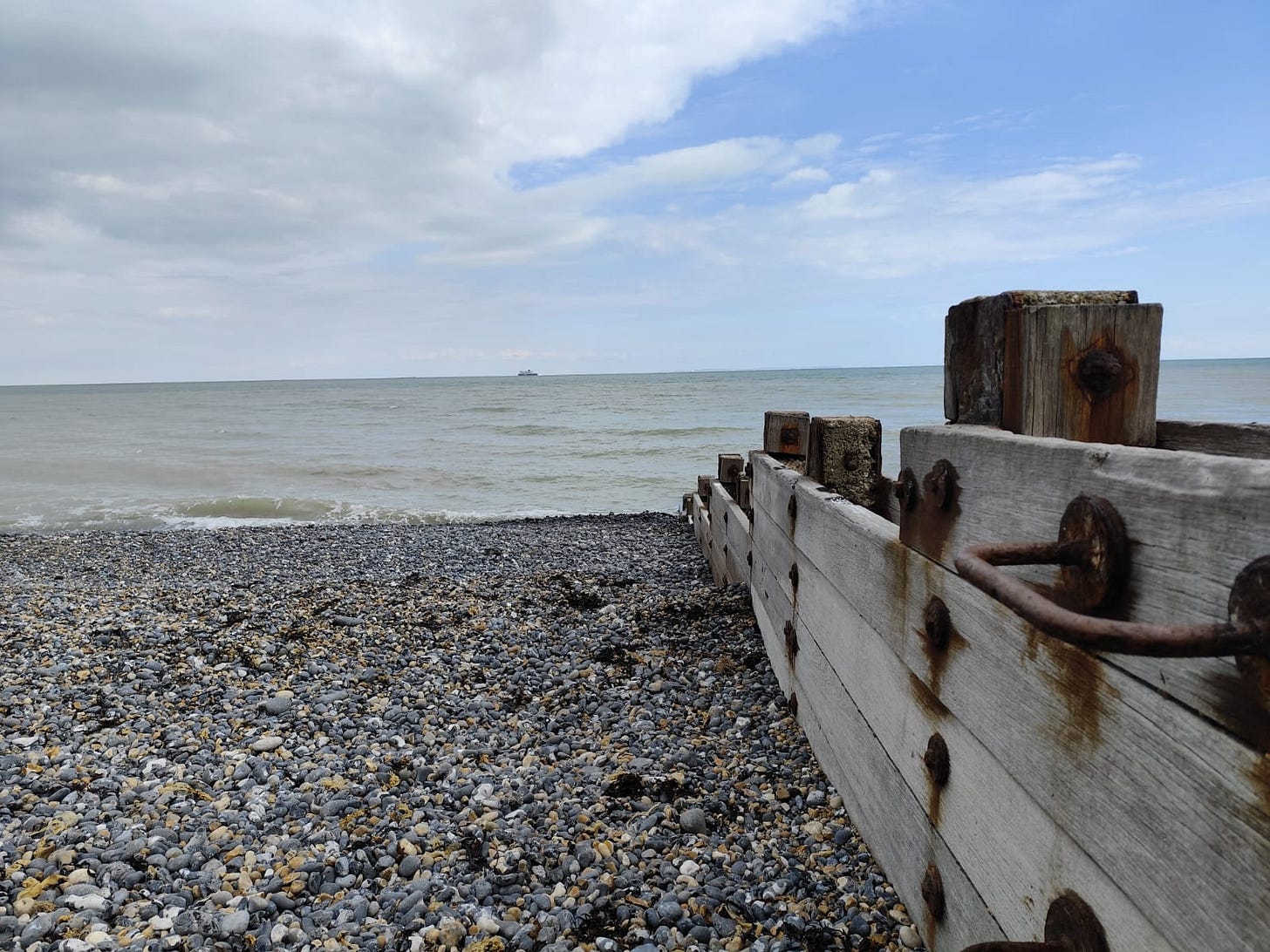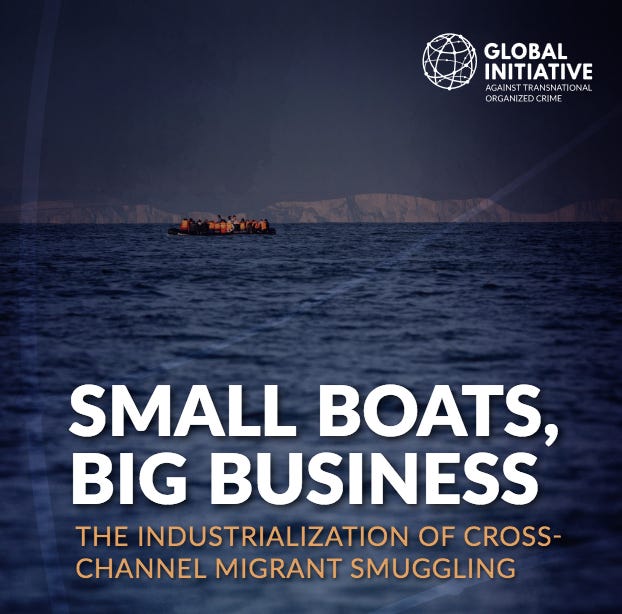Human Smuggling and the English Channel
The new Labour government promised to smash the gangs behind the small boats
NOTE - I published this story on asylum seekers coming on boats into the UK on July 21. Eight days later on July 29, three girls were stabbed to death in the town of Southport and it was initially and falsely blamed on social media on an asylum seeker. Days of riots ensued, which stem from a host of deep problems, in which rioters tried to set fire to a hotel housing asylum seekers in Rotherham. I am re-publishing this story now without a paywall in which I look at what are true facts around the wave of refugees crossing the English Channel on small boats and the gangs that run the business.
The pebble beach at St Margaret’s Bay just outside of Dover is one of the closest points between England and France and has long been a launching pad for those foolhardy enough to swim the English Channel. Over the last five years, the close vicinity has also made it a destination for voyagers traversing the 21 miles of choppy sea in small boats to claim asylum in the United Kingdom.
The vessels are rubber dinghies and other “rigid-hulled inflatable boats” provided by smugglers (for a large fee) and crowded with refugees and migrants from round the planet, faces from Somalia, Afghanistan, Albania, crammed together with life jackets. They leave France from the Calais area when the water is calm enough, which is mostly in the summer and autumn, and have small motors that shunt them forward.
If they keep straight some will get to St Margaret’s Bay or close by towns such as Deal but winds can push them down the coast, with a couple of boats arriving all the way in Hastings. The Border Force picks up many while they are still at sea and ferries them onto British soil.
The Channel crossers only count for about one in 20 of all the immigrants arriving in the UK but the image of crowded dinghies reaching the white cliffs spears them to the heart of the debate. For critics, they represent the failure of the government to enforce fundamental border laws and there is anger about the cost (some 8 million pounds a day) of housing them. Nigel Farage, who was the force behind Brexit and was recently elected to parliament for the Reform party, infamously described the small boats as an “invasion,” borrowing a term from the furor over the U.S.-Mexico border. Others see them as refugees at their most vulnerable, with boats capsizing and children drowning in the icy depths.
While asylum seekers have been a political issue in the UK since the 1990s, they used to arrive on planes or commercial ferries, which sparked tighter visa requirements. Migrants crossing on small boats began in earnest in 2018 and shot up to reach over 45,000 in 2022. By early July this year, more than 14,000 had been caught on the trip, a record for the first six months when the sea is rougher.
The Conservative government that ruled until this July dreamt up a scheme to send asylum seekers to the African republic of Rwanda to deter them. However, the plan was held up by the courts, both of the UK and the European Court of Human Rights, and no flights ever took place. (At least one person who had their asylum denied went to Rwanda in a voluntary deportation but that is different.)
Labour prime minister Keir Starmer, who won power on July 4, promised to scrap the Rwanda plan and instead to smash what he calls the “vile criminal gangs” behind the surge of crossings.
“Every week vulnerable people are overloaded onto boats on the coast of France. Infants, children, pregnant mothers – the smugglers do not care. They’re making a fortune, breaching our borders,” Starmer said on July 17 in The Sun newspaper - a right wing tabloid owned by tycoon Rupert Murdoch that recently switched to support Labour.
I have spent the last two decades covering the Mexico-U.S. border and was interested to see the comparison with the small boats on the Channel, which is close to where I grew up. The illegal crossings are on a far smaller scale than those over the Rio Grande but meanwhile legal immigration is having an even bigger impact in the UK than over the Atlantic. Yet the politics around the borders have similarities and, in both places, organized crime is taking advantage of the situation to make bank.
“They Want To Be In Custody”
Duncan, a 55-year old resident of St Margaret’s Bay, has seen two groups of migrants come onto the beach over the years in the very early mornings, one being ferried by the Border Force and one handing themselves into waiting agents.
“They looked relieved to reach land. Men were kissing the stones on the beach and seemed to be thanking God they had made it. It seemed they want to be in custody.”
Such sightings of the boats arriving are relatively rare though and many people in these seaside towns have never actually seen them. Despite the numbers coming - on July 19 alone, the Border Force detained 413 people in seven boats - they are spread up the coast and often come when residents are asleep.
This is a marked difference with people living in parts of the southwest United States, such as in the Rio Grande Valley of Texas, where crossings can be highly visible. It reflects the volume of traffic on the U.S. Border, with agents “encountering” over two million migrants last year, or 45 times more than those coming over the Channel.
Working for the local government, Duncan also believes that almost every migrant that makes it over the Channel is taken into custody. “The smugglers even give them mobile phones and a number to call so they can tell the Border Force they are coming,” he says.
This follows other government data. Open dinghies full of people are easy for the Border Force to detect and they have to be hours at sea in full view. It is not an effective way to sneak into the country.
Again, this contrasts with those crossing into the United States. Migrants have long been able to go in undetected across the he Rio Grande and Sonora Desert and this is still the core of the cartel human smuggling business. As well as the two million “encounters,” there are more people coming in who are not detected.
Some migrants also sneak into the UK, but they are more likely to do this by hiding in a truck that comes through the Channel Tunnel, where they have a better chance of making it. In 2019, the bodies of 39 Vietnamese migrants were tragically found in the refrigerated container of a lorry in Essex; the trailer had been shipped from Belgium to the docks at Purfleet.
This gets into the nature of the modern wave of asylum seekers. Asylum claims have shot up and many of those applying are now coming into countries illegally to file them. But while they break laws to cross the Channel, they legally make their asylum applications so they want to be in custody. People blame the Border Force for not stopping the boats but the agents are instructed to take the people in and don’t have authorization to turn them back at sea.
The gangs take advantage of this situation to deliver the migrants to the UK without having to keep them hidden. Smugglers will not even come on the boats themselves most of the time but just put them to sea and if they do go aboard they can blend in among the refugees. They create a network that provides boats, life jackets, places to stash them near the coast, and spots to launch them.
Fees to smugglers to cross vary from about 1,000 to 5,000 euros or even higher, according to reports. A study by the Global Initiative Against Transnational Organized Crime released in February looks at the economics of the smugglers.
“The price for a boat, including the logistics costs, is about €10,000,” it says. “This relatively modest outlay translates into extraordinary potential for profit: assuming an occupancy of 50 people, each paying €2,000, a single trip can generate €100,000.”
The report says the gangs are dominated by Kurds, with Iraqi Kurds controlling the most profitable beaches around Calais and Iranian Kurds pushed back to some of the beaches around Dunkirk. The smugglers work in cells of eight to twelve people, it says, with a kingpin giving them orders remotely, often from a different country.
The total value of the migrant smuggling was put at €150 million by Xavier Delrieu, head of the French Office for the Fight Against the Illicit Trafficking of Migrants. This is significant but again is dwarfed by the human smuggling business through Mexico, which former foreign secretary Marcelo Ebrard claimed was worth $14 billion.
Going After The Gangs
In a remote corner of Kent, in the village of Manston, down the road from the Jolly Farmer pub, lies an old army base, which has been repurposed as a processing center for asylum seekers. I drive round the walls and barbed wire and signs with threats of dogs and an official shouts at me not to take photos before I take the footage below. When the Border Force takes asylum seekers into custody this is their first stop.
After Manston, asylum seekers are scattered round the country, often in hotels, sparking the kickback. They go through a court case, which currently takes six to 12 months; in 2023 the courts accepted 63 percent of the applicants they reviewed.
The asylum seekers come from across the world with the top five countries in 2023 being Afghanistan, Iran, Pakistan, India, and Bangladesh. To make their case, they make statements about their persecution which can include being tortured and surviving shootings. Some requests are certainly fraudulent but the evidence shows others have solid cases.
This bigger question of asylum itself needs to be handled in a separate piece. But the difficulty of resolving problems like the small boats stems from the fact that asylum law genuinely give the applicants strong rights to make their claims. Maybe there needs to be a bigger public discussion about the laws themselves, but most politicians on either side simply want to fudge it.
As an example, Starmer has tried to paint it as just a law enforcement issue against gangs. On a morale level that is an easy position to take as neither the left or right are in favor of gangsters making money out of desperate voyagers.
There is doubt though whether law enforcement can make much difference. The gangs operate on French soil and don’t need to get on the boats and expose themselves to arrest. And when they are nabbed others can take their place.
Perhaps Starmer’s best bet would be to try and get the French government to stop the boats taking off. But Brits getting the French to do something is no easy ask.
The issue will likely become only more pressing for the Labour government. Starmer has taken power right as the season of crossing is taking off. Calm waters on the Channel will mean more travelers and increasing outrage voiced by a Farage contingent now in parliament. A record of boats this year would be an early blow for the new prime minister. Starmer may be hoping for rougher seas.
Thanks for supporting true independent journalism.
Copyright Ioan Grillo and CrashOutMedia 2024





The European migrant crisis of the 2010s is definitely something that polarized politics of the EU. They are still feeling the effects of it. Of course alot of people on the right of the spectrum point to George soros as being a facilitator. And I do agree to an extent. He is a very shady figure. But of course organized crime is also a problem. And the killing of Gaddafi didn't help either.
Excellent work, Ioan. Thank you.
A note - I did a couple of stories about the early days of the waves of illegal immigrants coming to Europe. Watching the boats come across the sea to Malta and Lampedusa felt like Muammar Gaddafi's Revenge from beyond the grave.
Before the Washington idiots and oil hungry French political class got rid of him, Libya was a secure country. Once, Gaddafi was killed it was turned into a Mafia-run thug state where the good people died, while the pimps, whorish mercenaries and oil executives run free. Enter the African organized crime groups (step forward the Black Axe Mafia) who traffick people across the desert and to the sea.
Now, much of the drive to right-wing politicians in Europe comes as a reaction to these waves of immigration. Gaddafi may have died in a ditch but he must be smiling now.